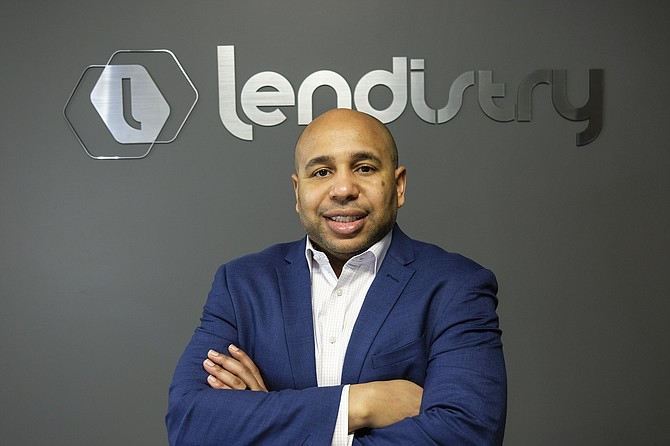If you need advice on social etiquette try Miss Manners. If you’re a small minority business owner who needs capital, Everett Sands is your man.
Sands is CEO of Lendistry and he’s helped thousands of small businesses in all 50 states secure loans through the Paycheck Protection Program. The company is the second largest lender in the Small Business Administration’s (SBA) Community Advantage program. Its mission: provide financing to small business owners and their underserved communities.
“Most small businesses were in a financial precarious position going into the pandemic. The pandemic actually exasperated the situation,” Sands said.
He said that said many small businesses are missing the infrastructure and know-how to put together the proper paperwork for a variety of things.
“Lending specifically, was exposed… the second thing that was exposed was the lack of capital,” he said. Many small businesses also lack reserves to carry them through hard times.
The U.S. has 4 million small businesses that create 1.5 million jobs with annual sales close to $700 billion. When COVID-19 hit, many of those enterprises had to rapidly pivot. Some 200,000 small businesses shut down permanently.
“We’ve tried to focus on all three of those things by trying to help educate small businesses on the different opportunities and the different ecosystem out there,” Sands said.
In Pennsylvania, for example, Lendistry and 17 other mission-based lenders disbursed about $280 million in loans. In California, 60 partners and 500 sub-partners deployed about $2.5 billion.
“We’ve spent a significant amount of time running 12 programs trying to help small businesses understand that there are opportunities for them to receive capital,” Sands said.
Most owners know about the SBA that is running the PPP program. But most states have small business programs, too.
“New York has a loan guarantee program to help small businesses when they don’t have collateral. Washington and California do, too.
Most states received roughly a billion dolls in the American Rescue Plan. “The majority of that money appears that it’s going to be concentrated towards small business for obvious reasons: to bring back jobs. to spur the economy, and also to help the city, state or county increase its revenue,” he said.
“We were recently awarded $1 billion dollars by Goldman Sachs for PPP loans.” Lendistry received tens of thousands of applications in the last few weeks. “Sixty to seventy percent of those businesses are minorities,” he said.
The SBA removed a lot of impediments for that latest PPP rounds. The application for loans less than $150,000 has been streamlined. Single proprietors with income or criminal histories, or outstanding student loans, could apply.
“Most of what we would normally call ‘red tape’ or the bureaucratic process of a loan has been clear away,” Sands said.
Funds that Congress earmarked for minority business are still available through Community Financial Institutions, Community Development Corporations, and micro-deposit institutions— small banks that have less than $1 billion in assets.
Sands said about $350 billion in the American Rescue Plan is going to states, counties and cities with greater than 200 thousand in population.
“That money in this moment while we are re-opening represents capital that can be catalytic where as before the previous capital was to make sure that businesses could hold on.”
If your business is still open or manage to reopen and you have some revenue, you should be able get some grant money.
Sands said that small business owners must look at advocacy work to find out where the money is going and who it’s going out to. “Talk to economic development in the state, city, and county to find the programs.”
“What we’ve learned through the pandemic is that most opportunities are going to come a second time. If you look at PPP, it has come a third time. And so it’s important that businesses apply. “
Sands said Congress could add more money to the PPP program. “Are you ready for when it gets opened back up if you missed it or if you didn’t fill out the application correctly?”
Congress also approved $10 billion in credit enhancement capital (SSBCI). It’s geared to the many small businesses that used their financial reserves to survive the pandemic and don’t have the collateral to get a loan now.
At this time last year, the PPP grogram was roundly criticized for giving loans to businesses that didn’t need them The SBA has done a much better job with the second and third rounds.
Although tens of thousands of minority businesses shut down down during the pandemic, something quite remarkable has happened. There has been a big rise in start-ups despite the pandemic.
Research has shown that the surge coincided with the federal stimulus and it’s strongest in Black communities. Economists looked at new business registrations in eight states, including Tennessee.
A recent report published by the National Bureau of Economic Research found an increase in start-ups particularly in neighborhoods with higher median incomes and a higher proportion of Black residents.
Some new entrepreneurs opened opportunity businesses, like online retail or childcare. Others started a necessity business, a side gig that became a fulltime job. Necessity business start-ups increased from 13% in 2019 to 30% in 2020.
Between 2019 and 2020, in Atlanta and its suburbs the number of new businesses more than doubled and in some zip codes quadrupled.
This story was brought to you by the Blue Cross Foundation of California and Ethnic Media Services.



